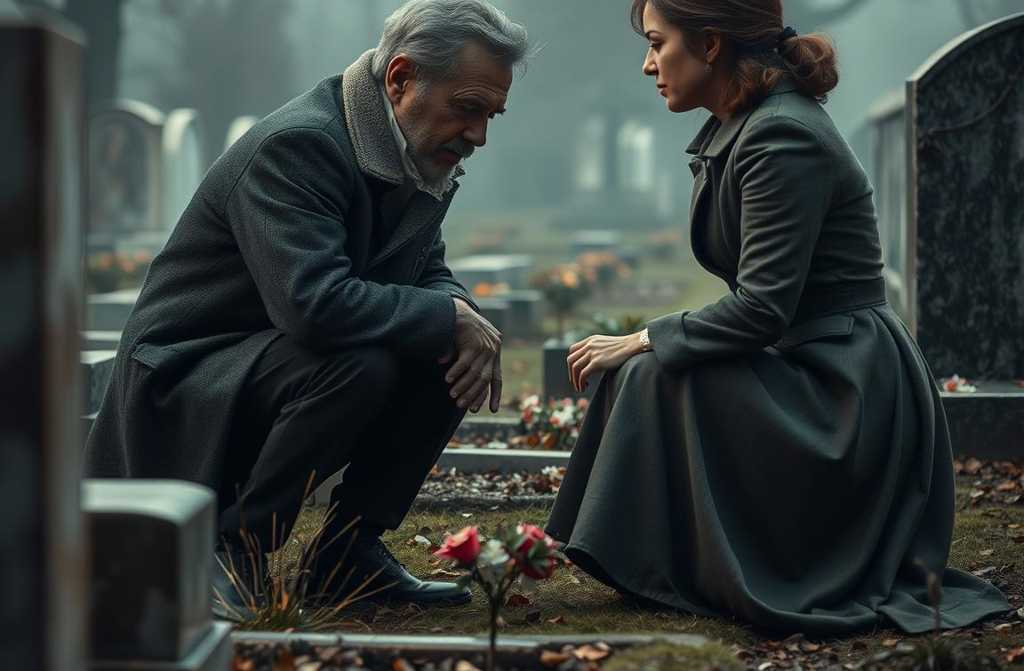At the grave, a wealthy lady heard a homeless man ask, “Did you know my mother too?” She collapsed in a faint.
For most, a cemetery is a place of farewells, sorrow, and endings. For Lenny, it had become something like homenot in the literal sense, for he had no roof over his head save for an old granite crypt where he sought shelter only in the bitterest cold. But in spirit, in soul, he felt at peace there.
Silence reigned, broken only by birdsong and the occasional sob of mourners. No one looked down on him here, no one chased him away or pointed at his threadbare coat and worn-out boots. The dead cared notand in that, there was a strange, soothing justice.
Lenny woke to the chill, dew clinging to his cardboard blanket. The air was crisp, mist curling over the graves as if shielding them from the world. He rubbed his eyes and, as he did every morning, surveyed his kingdomrows of crosses, headstones, weathered and moss-covered.
His day began not with tea, but with rounds. He checked for disturbed wreaths, overturned flowers, any trace of intruders. His only friendand in a way, his bosswas old Stan, the caretaker, gruff-voiced but kind-eyed.
“Still here, rooted like a tree?” Stans raspy voice called from the gatehouse. “Come inside, have some warm tea before you catch your death.”
“In a minute, Stan,” Lenny replied, not looking up from his task.
He made his way to a modest grave in the far corner. A simple grey slab read: “Antonia Margaret Wilson. 19652010.” No photograph, no comforting words. Yet to Lenny, it was the holiest place on earth. Here lay his mother.
He barely remembered herher face, her voice. His earliest memories were of the orphanage, of cold walls and strange faces. She had left too soon. But at her grave, he felt warmth, as if someone unseen stood beside him. As if she still watched over him. Mum. Antonia.
He plucked weeds, wiped the stone with a damp cloth, adjusted the small bunch of wildflowers hed left the day before. He spoke to herabout the weather, the crow that cawed yesterday, the soup Stan had shared. He complained, thanked her, asked for protection. He believed she heard him. That faith was his anchor. To the world, he was a nobody. But here, by this stone, he was someone. He was a son.
The day passed as usual. Lenny helped Stan repaint a fence, earned a bowl of hot stew, and returned to his “mum.” He crouched, telling her how the sun had broken through the mistwhen a sudden sound shattered the quiet: the crunch of tyres on gravel.
A sleek black car rolled up to the gate. A woman stepped out, elegant as if from a magazinecashmere coat, perfect hair, a face marked not by suffering, but by dignified grief. In her hands, an extravagant bouquet of white lilies.
Lenny shrank back, trying to vanish. But she walked straight toward him. Straight to his mothers grave.
His chest tightened. She stopped before the headstone, shoulders shakingsilent, deep sobs. She knelt, heedless of her expensive clothes, and laid the lilies beside his humble flowers.
“Excuse me…” Lenny whispered, unable to stay silent. He felt like the guardian of this place. “Did… did you know her?”
The woman flinched, lifting tear-filled eyes to his.
“Yes,” she murmured.
“Did you know my mum?” Lenny asked, painfully earnest.
For a moment, confusion flickered in her gaze. She studied himhis tattered clothes, thin face, eyes full of simple trust. Then she looked back at the inscription: “Antonia Margaret Wilson.”
And suddenly, she understood. It hit her like a blowshe gasped, turned pale, lips trembling. Her eyes rolled back, and she swayed. Lenny caught her just before she struck the stone.
“Stan! Stan, help!” he shouted, frantic.
The caretaker came running, puffing, but knew what to do. “Get her to the gatehouse! Move!”
Together, they carried her inside, laying her on the old sofa. Stan splashed water on her face, held smelling salts under her nose. She groaned, blinked, disorientedthen her gaze settled on Lenny, standing there clutching his battered cap.
She stared at him, long and searching. The shock faded, replaced by unbearable sorrowand something like recognition. She reached out, whispering words that upended his world:
“How long… how long Ive searched for you…”
Lenny and Stan exchanged glances, stunned. Stan handed her water. She drank, steadied herself, and spoke.
“My name is Eleanor,” she said softly. “To explain… I must start from the beginning.”
And she did. Her story dragged them back thirty years.
Shed been a young girl from a forgotten village, dreaming of a better life in London. Penniless, friendless, shed taken a job as a maid in a wealthy household. The mistressa cold, domineering widowruled with an iron fist. The only light in Eleanors life was the widows son, Edward. Handsome, charming, but weakutterly under his mothers thumb.
Their love was secret, doomed. When Eleanor fell pregnant, Edward panicked. He promised marriage, defiancebut under pressure, he crumbled. The widow would never accept a paupers grandchild.
Eleanor was kept hidden until the birth, then paid off and sent awayher child to an orphanage. Only one woman had stood by her: another maid, Toni. Antonia.
Quiet, unassuming, Antonia brought her food, comfort, solace. Eleanor thought her a true friend, blind to the shadow in her eyesenvy. A bitter, gnawing envy of Eleanors youth, beauty, love… even of the child Antonia herself could never have.
The birth was difficult. When Eleanor woke, they told her the baby had been too frail, had died within hours. Her heart shattered. Dazed with grief, she was cast out with a pittance. Edward never even said goodbye.
Years passed. The pain dulleduntil, by chance, Eleanor learned the truth. Antonia had quit soon after, leaving a confession with another maid: shed switched Eleanors healthy son with a stillborn infant, bribing a nurse.
Shed stolen Eleanors child. Why? Some twisted mix of pity and longing. Shed wanted to be a mother. To love. To claim some shred of the life shed never had. In the note, she swore to raise the boy as her own, to love him fiercely. Then she vanished.
From then on, Eleanor searched. Years. Decades. She followed every lead, hired investigatorsall in vain. Her son might as well have been a ghost.
Now, her tale ended, she looked straight at Lenny, who sat dumbstruck. Stan stood silent, forgotten cigarette smoke curling toward the ceiling.
“Antonia… the woman you called mum,” Eleanor whispered, voice trembling, “was my friend. And my betrayer. She stole you from me. I dont know why she left you. Maybe guilt, maybe fear. This grave… perhaps she bought it to atone. Its the only sense I can make.”
Lenny said nothing. His worldbuilt on a simple, if painful, truthwas crumbling. The woman hed loved was his kidnapper. His real mother sat before hima stranger in fine perfume.
“But theres more,” Eleanor continued softly. “Months ago, Edward found me. Your father. Hed lived with guilt all these years. His mother died; he inherited everything but never knew happiness. Now… hes dying. Wanted to make amends. He spent a fortune hiring detectivesthey found me. Then… they found you, Lenny. Traced Antonias steps, learned which orphanage took you. Edward gave me everything he had, begged me to bring you to him. Hes in hospice, Lenny. Days left. Maybe hours.”
Her voice broke. Silence hung thick, save for the ticking clock and Lennys ragged breaths. The truth was too vast, too cruel to grasp at once.
He sat, head bowed, staring at his dirty hands, torn trousers, shoes with socks peeking through. His whole life flashedhunger, cold, scorn, loneliness. All built on a lie. The woman hed loved had stolen his mother. His real mother sat beside him. And somewhere, a father hed never known lay dying.
“Lenny…” Eleanor pleaded. “Please. Come with me. Hes waiting. He needs to see you. Before the end.”
He looked up. Storm in his eyespain, anger, disbelief… and shame. Bitter shame for his rags, his filth, for facing a dying mana fatheras this wretched figure.
“I… I cant,” he choked out. “Look at me…”
“I dont care what you look like!” Eleanor snapped, sudden and fierce. “Youre my son! Mine! And were going. Now







